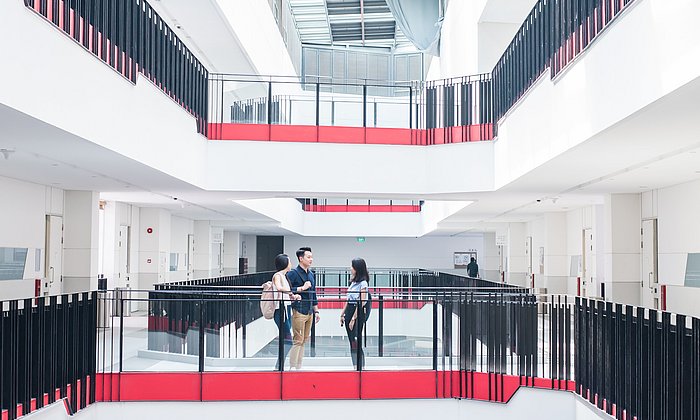Career in Singapore: Stefan Klade
From gourmet kitchens to food labs

Stefan Klade is hardly alone with his passion for the culinary arts in his chosen home of Singapore: "Eating out is so easy here," he says. "There is so much diversity in Singapore – from small food stalls in the hawker centers all the way to top-class restaurants. Accordingly, a lot of talk in the office is about where you ate recently and what you're going to try out next."
Stefan Klade's workplace is on the lively campus of one of Singapore’s largest universities. Around 40 scientists work at TUMCREATE, where TUM jointly conducts a variety of research projects together with partner universities, companies and government authorities. One of the research projects, Proteins4Singapore, is certainly close to Stefan Klade’s heart. Researchers from the fields of food sciences, process engineering, food chemistry and agricultural sciences develop protein-rich products that taste good, are healthy and that can be produced sustainably in a megacity like Singapore. Because of the limited space available, the city-state is almost completely dependent on imports. The objective of Singapore's government “30-by-30” strategy is to produce a third of the food demand locally by 2030.
Plants in the cabinet
"Proteins4Singapore is about innovating technologies and re-thinking the concepts of producing food in urban environments. The result may even be a completely new food product," Stefan Klade says. "We want to demonstrate what's technologically possible, even without wide-scale agriculture." That starts with growing the raw materials: In tall, space-saving plant cabinets, referred to as vertical farming systems, soy plants and microalgae grow together while sharing resources like light and water. The team is also researching new solutions for the different steps of the production process like extracting, concentrating or fermenting. "In the project we even want to look into developing the food production hardware ourselves," says Klade. He's referring to a household 3D printer which can be used to produce food decentralized, on site. The end-product could be food that tastes like chicken and resembles the texture of roast chicken breast, if possible even with crispy skin. The product will also be optimized in terms of its nutritional properties.
We want to demonstrate what's technologically possible, even without wide-scale agriculture.
And it all comes together with Stefan Klade. In his role as Director of Research and Innovation at TUM’s research platform TUMCREATE in Singapore, he controls project flows, establishes networks with partner institutions and is the central contact point for the researchers. He discovered that he might grow into this kind of work during his days as a chef in a Michelin star restaurant in Munich. "My skills weren't outstanding enough for that cuisine’s quality, my colleagues were better and faster with it," he recalls. "My strengths are planning and managing, organizational things."
In 2006, the Nuremburg native decided to study Food Chemistry at TUM, followed by a doctoral thesis on coffee bitterness. He continued as project manager at the TUM Chair of Food Chemistry and Molecular Sensory Science and switched to science management at the TUM Office for Research and Innovation (TUM ForTe) in 2020. Working at the interface between science and administration, he helped establish the Proteins4Singapore project and has been coordinating it ever since. For six months, Stefan Klade transferred between Bavaria and Southeast Asia every four weeks: "I felt like I was tossing things up in Freising and catching them again in Singapore."
At the same time, he completed the "Science Manager" certificate course at the TUM Institute for LifeLong Learning, designed as in-service training. "This means it's easy for me to put myself in the shoes of the various people involved," he says. "I can understand the needs of the researchers and at the same time I know which strategic and administrative requirements are part of an international research project."
Between Freising and Singapore
Since the beginning of this year, the 41-year-old has lived and worked in Singapore full-time. "I'm very happy to be able to support the international and young team at TUMCREATE. My work is never boring," he says. Stefan Klade especially appreciates the proximity to other renowned universities: "We're literally next-door neighbors with MIT, Cambridge and ETH Zurich; Nanyang Technological University is only a few minutes' drive away. Having partner universities and the TUM systems of science and teaching on your side makes the work more enjoyable."
In his current job, Stefan Klade is glad to have his culinary experience in Michelin star kitchens: "That's where I got my resilience, my approach to application and a sense for the customers' point of view." And of course he still hasn't lost his enthusiasm for eating: "Ultimately, we want to create food in the Proteins4Singapore project that tastes good and that people here love eating."
The CareerDesign@TUM program at the TUM Institute for LifeLong Learning helps scientists find and follow alternative career paths to professorships. CareerDesign@TUM features five qualification paths:
• TUM Learning Professional (since 2022)
• TUM Researcher (since fall 2023)
• TUM Science Manager (since 2021)
• TUM Technical Expert (planned to start in 2024)
• TUM Entrepreneurship Advisor (since 2022)
Each program includes approximately 300 hours (course program, career coaching, peer mentoring, job shadowing, transfer project) and is completed in 12+ months. Participation is voluntary and requires an application.
Technical University of Munich
Corporate Communications Center
- Undine Ziller
- presse@tum.de
- Teamwebsite
Contacts to this article:
Dr. Stefan Klade
TUMCREATE
Director Research & Innovation
Coordination Proteins4Singapore
Tel. +65 8740 0214
stefan.klade@tum-create.edu.sg


